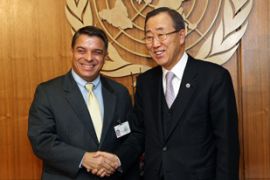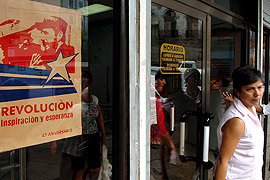Cuba signs human rights accords
New government approves UN covenants long opposed by Fidel Castro.

However, Felipe Perez Roque, the Cuban foreign minister, said in New York on Thursday that no such foreign pressure played a part in his signing on Thursday of the International Covenant on Economic, Social and Cultural Rights and the International Covenant on Civil and Political Rights.
| Your Views |
After meeting Ban Ki-moon, the UN secretary-general, he said the signing “formalises and reaffirms Cuba’s commitment to the rights protected in both instruments which my country has been systematically implementing since the time of the Cuban revolution in 1959.
“The act of signing both covenants responds to a sovereign decision of the Cuban government.
“Cuba has never acted nor will act under pressure.”
The Covenant on Civil and Political Rights guarantees “civil and political freedom” including the right to self-determination and peaceful assembly, to freedom of religion and freedom to leave the country, and to equal protection before the law.
It also bans unlawful interference with privacy.
Right to work
The International Covenant on Economic, Social and Cultural Rights requires countries to ensure the right to work, to fair wages, to form trade unions and allow all people to join the union of their choice, to social security, to education and the highest attainable standard of physical and mental health.
One reporter pointed out to Perez Roque that Fidel Castro opposed provisions in both covenants including the right to form independent trade unions, and asked whether this had changed now that Raul has become Cuba’s leader.
Perez Roque said there has been no change, reiterating that “in the future, in the moment that we decide, we will express … the reservation or interpretative declaration that we consider relevant”.
Dissident issue
In Havana, a European diplomat called the signing “a first step in the right direction” by the new government and hoped it would be followed up by the freeing of jailed dissidents.
Cuba is a one-party state which critics say has imprisoned more than 200 political prisoners.
Cuba says it holds no political prisoners and labels all dissidents as “mercenaries” on the payroll of the US government.
 |
| The signing is the government’s first international act after Fidel Castro [AFP] |
Perez Roque had announced on December 10 that Cuba’s intention to adhere to the UN accords.
He also said then that Cuba would allow regular international scrutiny by the recently created UN Human Rights Council from early in 2009.
Cuba has refused visits by a special rapporteur appointed by the council’s predecessor, the UN Human Rights Commission, which Havana said was manipulated by the US.
In June, the Geneva-based council dropped Cuba from a list of special investigatory mandates for countries where human rights records are of particular concern, in a move criticized by the US and Canada.
Despite his criticism of the US, Perez Roque did claim on Thursday Cuba is “ready to maintain normal and respectful relations with the United States”.
But he said a 46-year-old trade embargo on Cuba has to be lifted “without any conditions whatsoever”.